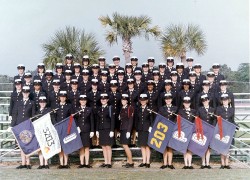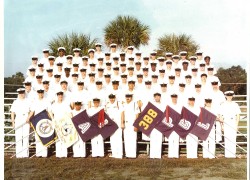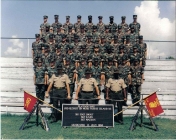The Nutrition Care Specialist is primarily responsible for assisting in the supervision of medical nutrition care operations.
68M1O - Skill Level One




Nutrition Care Specialist: Perform basic clinical dietetics functions in the dietary management and treatment of patients in nutrition clinics, clinical dietetics branches, health promotion and wellness clinics. Perform nutritional assessments and screening of individual patients for nutritional risk. Prepares and serves modified and regular food items in the management of the normal nutrition needs of individuals across the life span, i.e., infants through geriatrics and a diversity of people, cultures and religions in support of the mission, under the supervision of a dietitian or NCO.
68M2O - Skill Level Two

Nutrition Care Sergeant: Performs and supervises basic clinical dietetics functions in the dietary management and treatment of patients in nutrition clinics, clinical dietetics branches, health promotion and wellness clinics. Perform nutritional assessments and screening of individual patients for nutritional risk. Prepares and serves modified and regular food items in the management of the normal nutrition needs of individuals across the life span, i.e., infants through geriatrics and a diversity of people, cultures, and religions in support of the mission, under the supervision of a dietitian or senior NCO.
68M3O - Skill Level Three

Nutrition Care Sergeant: The 68M30 supervises the management aspects in nutrition clinics, health promotion and wellness clinics, and the production and service branches. The Nutrition Care Sergeant is responsible for the gathering of nutritional data, applying nutritional data, providing nutritional education, developing personnel, managing supplies, equipment use, managing food production, the hiring and supervising of civilian employees in all nutrition operations, and managing the overall business operations in the Nutrition Care Branch.
68M4O - Skill Level Four

Nutrition Care NCO: Supervise the clinical dietetics management aspects in nutrition clinics, clinical dietetic divisions, health promotion and wellness clinics and production and service divisions. Supervise the performance of basic clinical dietetics functions in the dietary management and treatment of patients and staff. Supervise the nutritional assessment and screening of individual patients. Supervise the preparation and service of modified and regular food items in the management of the normal nutrition needs of individuals across the life span, i.e., infants through geriatrics and a diversity of people, cultures, and religions in support of the mission, under the supervision of a dietitian.
68M5O - Skill Level Five

Senior Nutrition Care NCO: Supervise the Nutrition Care Division. Manage the day-to-day operations of the division. Ensure that all resources are available to the division. Serve as the primary hand-receipt holder and budget manager. Ensures training for all staff members is conducted and coordinated with the Combat Support Hospital (CSH) for Medical Proficiency Training (MPT) in accordance with FORSCOM Regulation 350-1, in support of the hospital’s mission essential task list (METL).
Operations Sergeant: The Operations Sergeant assists in organizing, and coordinating the company/battalion/brigade and supporting unit’s operations. He is the noncommissioned officer in charge (NCOIC) of the operations in the absence of the Executive/Operations Officer. The Operations Sergeant advises the Company/Battalion/Brigade Commander on the current and future employment of the unit. He maintains the current operational status of the unit. He organizes, deploys and supervises the field Tactical Operations Center (TOC).
First Sergeant: The First Sergeant is the senior NCO in companies, batteries and troops. The position of first sergeant is similar to that of the CSM in importance, responsibility and prestige. As far back as the Revolutionary War period, first sergeants have enforced discipline, fostered loyalty and commitment in their soldiers, maintained duty rosters and made morning reports to their company commanders. Since today’s first sergeants maintain daily contact with and are responsible for training and ensuring the health and welfare of all of the unit’s soldiers and families, this position requires extraordinary leadership and professional competence. First sergeants hold formations, instruct platoon sergeants and assist the commander in daily unit operations. Though first sergeants supervise routine administrative duties their principle duty is training soldiers. The CSM, first sergeant and other key NCOs, must understand the organization’s collective mission essential tasks during METL-based training. Through NCO development programs, performance counseling and other guidance, first sergeants are the Army’s most important mentors in developing subordinate NCOs.
Operations Sergeant: The Operations Sergeant assists in organizing, and coordinating the company/battalion/brigade and supporting unit’s operations. He is the noncommissioned officer in charge (NCOIC) of the operations in the absence of the Executive/Operations Officer. The Operations Sergeant advises the Company/Battalion/Brigade Commander on the current and future employment of the unit. He maintains the current operational status of the unit. He organizes, deploys and supervises the field Tactical Operations Center (TOC).
First Sergeant: The First Sergeant is the senior NCO in companies, batteries and troops. The position of first sergeant is similar to that of the CSM in importance, responsibility and prestige. As far back as the Revolutionary War period, first sergeants have enforced discipline, fostered loyalty and commitment in their soldiers, maintained duty rosters and made morning reports to their company commanders. Since today’s first sergeants maintain daily contact with and are responsible for training and ensuring the health and welfare of all of the unit’s soldiers and families, this position requires extraordinary leadership and professional competence. First sergeants hold formations, instruct platoon sergeants and assist the commander in daily unit operations. Though first sergeants supervise routine administrative duties their principle duty is training soldiers. The CSM, first sergeant and other key NCOs, must understand the organization’s collective mission essential tasks during METL-based training. Through NCO development programs, performance counseling and other guidance, first sergeants are the Army’s most important mentors in developing subordinate NCOs.
School Information
School: 081 School Location: FT SAM HOUSTON, TX
Course Title: NUTRITION CARE SPECIALIST
Course: 800-68M10 Phase: Course Length: 7 Weeks 0.0 Days
Verifiable Prerequisites
PULHES 222332 Required
Must meet height weight std IAW AR 600-9 YES Required
Normal Red/Green (RG) Perception YES Required
Physical Demand Rating MODERATELY HEAVY - LIFT OCCASIONAL 80 LB, FREQUENT 40 LB Required
Career Management Field 68 - MEDICAL Required
ASVAB OFSC Score 095 Required
Prerequisite Courses
There are no Prerequisite Courses.
Text Prerequisites
Open to Active Army (AA) SPC non-promotable and below, National Guard and Army Reserve SSG (see special information) and below, and DOD civilians. AA and RC soldiers holding MOS 68A, 68K, 68P , 68V and 68WM6 will not be considered. The service-remaining requirement (SRR) for in-service AA soldiers upon completion of this course is nine (9) months, IAW AR 614-200, Chapter4, Table 4-1. SRR for RC is governed by NGR 351-1 (2 Years) or AR 135-200 (2 Years). As an exception to policy, USAR Soldiers are TEMPORARILY waived the requirement to fulfill the Ready Reserve obligation upon completion of the course. This policy will be effective for the duration of Partial Mobilization. Soldiers must successfully complete the 92G training prior to attending 68M training. Enlisted women who are pregnant will be processed IAW AR 635-200. Prior to the departure from home station, soldiers are required to reenlist or extend their term of enlistment in order to fulfill the SRR upon completion of the course. When reporting to the AMEDDC&S for training, and it is determined that soldiers do not meet the SRR they will not be accepted into the course unless the SRR is fulfilled. The physical serials (PULHES) applies only to initial entry soldiers, and is not to be used for soldiers reclassifying into this MOS. A minimun score of 100 in apptitude area OF in Armed Forces Vocational Apptitude Battery (ASVAB) tests administered prior to January 2002. A minimum score of 95 (OF) after January 2002, and a minimun score of 95 (OF) on or after 1 July 2004. SECURITY: None
Course Scope:
To train enlisted personnel in nutrition care operations to include clinical dietetic concepts and functions, therapeutic and regular patient diet preparation, assembly and service, and Army medical field feeding concepts and functions in a mobile environment. Upon successful completion of the course, graduates are awarded the 68M10 MOS.
Special Information:
Reserve Component soldiers will arrive at Fort Sam Houston with the following items: MPRJ 201file, Medical Record, Dental Record and complete basic clothing issue, to include running shoes. DoD civilians must submit a DA1556 requesting attendance at this course. The Unit of assignment for DoD civilians will incur all costs associated with attendance at this course. AA and RC soldiers must submit DA Form 4187, ERB, DA Form 2-1, transcripts, and letters of recommendations from the chain of command. National Guard and Army Reserve SSGs' will receive a certificate of completion for attending this course; additional skill level 30 training is required to be awarded the MOS. SUBMIT ALL REQUESTS FOR WAIVERS TO: CDR, AMEDD Center & School, AMEDD Personnel Proponent Directorate, ATTN: MCCS-DE, 2427 Hood Street, Fort Sam
Houston, TX 78234-7584.
Course Title: NUTRITION CARE SPECIALIST
Course: 800-68M10 Phase: Course Length: 7 Weeks 0.0 Days
Verifiable Prerequisites
PULHES 222332 Required
Must meet height weight std IAW AR 600-9 YES Required
Normal Red/Green (RG) Perception YES Required
Physical Demand Rating MODERATELY HEAVY - LIFT OCCASIONAL 80 LB, FREQUENT 40 LB Required
Career Management Field 68 - MEDICAL Required
ASVAB OFSC Score 095 Required
Prerequisite Courses
There are no Prerequisite Courses.
Text Prerequisites
Open to Active Army (AA) SPC non-promotable and below, National Guard and Army Reserve SSG (see special information) and below, and DOD civilians. AA and RC soldiers holding MOS 68A, 68K, 68P , 68V and 68WM6 will not be considered. The service-remaining requirement (SRR) for in-service AA soldiers upon completion of this course is nine (9) months, IAW AR 614-200, Chapter4, Table 4-1. SRR for RC is governed by NGR 351-1 (2 Years) or AR 135-200 (2 Years). As an exception to policy, USAR Soldiers are TEMPORARILY waived the requirement to fulfill the Ready Reserve obligation upon completion of the course. This policy will be effective for the duration of Partial Mobilization. Soldiers must successfully complete the 92G training prior to attending 68M training. Enlisted women who are pregnant will be processed IAW AR 635-200. Prior to the departure from home station, soldiers are required to reenlist or extend their term of enlistment in order to fulfill the SRR upon completion of the course. When reporting to the AMEDDC&S for training, and it is determined that soldiers do not meet the SRR they will not be accepted into the course unless the SRR is fulfilled. The physical serials (PULHES) applies only to initial entry soldiers, and is not to be used for soldiers reclassifying into this MOS. A minimun score of 100 in apptitude area OF in Armed Forces Vocational Apptitude Battery (ASVAB) tests administered prior to January 2002. A minimum score of 95 (OF) after January 2002, and a minimun score of 95 (OF) on or after 1 July 2004. SECURITY: None
Course Scope:
To train enlisted personnel in nutrition care operations to include clinical dietetic concepts and functions, therapeutic and regular patient diet preparation, assembly and service, and Army medical field feeding concepts and functions in a mobile environment. Upon successful completion of the course, graduates are awarded the 68M10 MOS.
Special Information:
Reserve Component soldiers will arrive at Fort Sam Houston with the following items: MPRJ 201file, Medical Record, Dental Record and complete basic clothing issue, to include running shoes. DoD civilians must submit a DA1556 requesting attendance at this course. The Unit of assignment for DoD civilians will incur all costs associated with attendance at this course. AA and RC soldiers must submit DA Form 4187, ERB, DA Form 2-1, transcripts, and letters of recommendations from the chain of command. National Guard and Army Reserve SSGs' will receive a certificate of completion for attending this course; additional skill level 30 training is required to be awarded the MOS. SUBMIT ALL REQUESTS FOR WAIVERS TO: CDR, AMEDD Center & School, AMEDD Personnel Proponent Directorate, ATTN: MCCS-DE, 2427 Hood Street, Fort Sam
Houston, TX 78234-7584.




